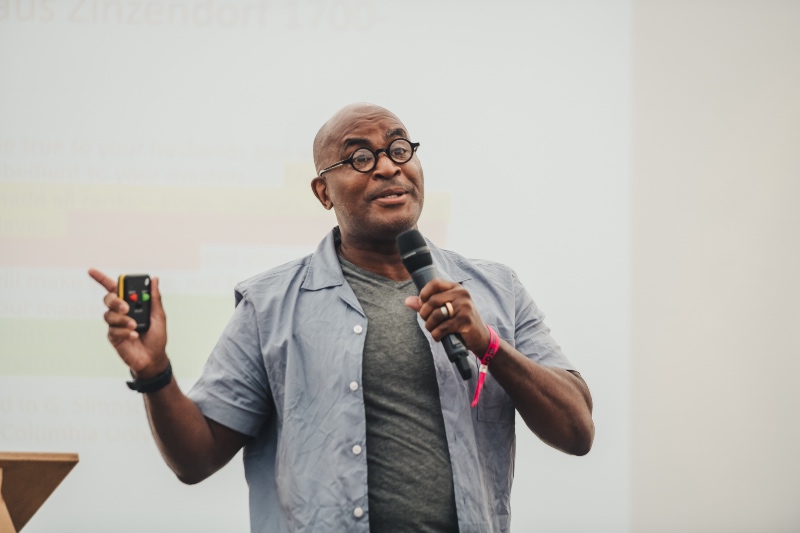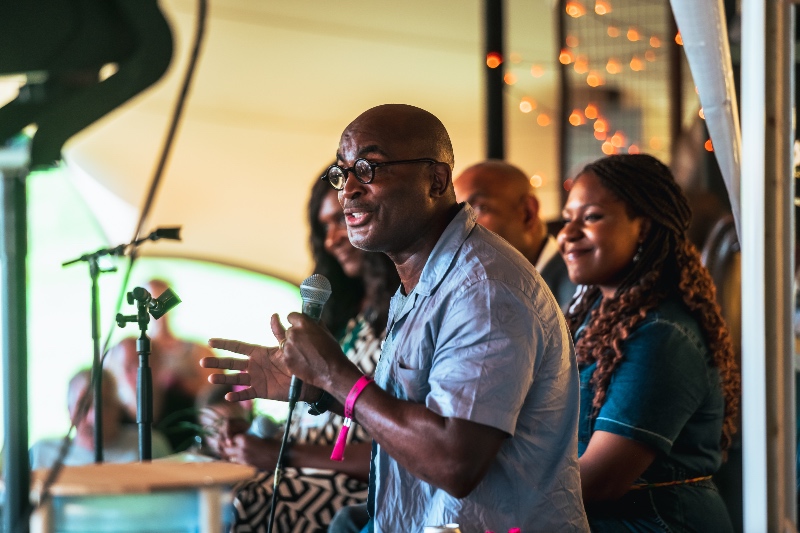'I hope it will inspire people to take action'
Robert Beckford is a climate and social justice professor at the University of Winchester who works to confront and overturn injustice across various social issues in the African diaspora.
He spoke with The Baptist Times at this year’s Greenbelt about why the climate crisis is a racist crisis, his thoughts on a new racial justice training programme for Baptist ministers, and the growing impact of a recently released documentary on Christianity, slavery and reconciliation.
Interview by Alex Baker
 At Greenbelt you are part of a panel discussing why the climate crisis is a racist crisis. Can you briefly unpack why this is the case? Is there a role for churches here? And if so, what?
At Greenbelt you are part of a panel discussing why the climate crisis is a racist crisis. Can you briefly unpack why this is the case? Is there a role for churches here? And if so, what?
Yeah, that's a really good question. The three reasons why we say the climate crisis is a racist crisis is as follows. One, because of colonialism. Colonialism was fundamentally about extracting raw materials and dumping rubbish in the southern hemisphere, the African continent, the Caribbean. The Caribbean is a great example. Extracting the profit from sugar, dumping all the waste material on the island, including destroying the land. And we know colonialism has running through its veins issues of racial hierarchy and specifically white supremacy. So we see that as being racist origins.
We also see it as being racist for a second reason because of how it's played out as a consequence of that. Whether you're talking about the Southern Hemisphere or Northern Hemisphere, because of issues of migration and racism in Britain where people could live but where people could flourish, it means that in Britain and in North America, the people who are most likely to be negatively impacted by climate justice are black and brown communities.
It's partly due to things like just don't have enough shade in your community because there are no trees are planted on many of the estates where black and brown people live. If the surfaces where your neighbourhood is built is built on particular materials like asphalt, it's just going to be warmer. So you're more likely to live in a place which is vulnerable to climate change, in terms of heating, if you're a black and brown person in Britain today.
Also, as Black Lives Matter showed us five years ago, if you're looking at where flight paths occur across London, they are passing through areas that are densely populated with black and brown people. So consequently, in terms of air pollution and that works in terms of traffic pollution, black and brown communities in London are just more vulnerable to climate change. Now, black and brown people haven't ended up in those communities and in those locations by chance. There have been systematic processes and policies that have disenfranchised black homeowners from moving into particular areas in British history. So we're living with that legacy.
So for those two reasons, we talk about climate change as being a racist issue because of race in the history, because of race in the present.

But I would argue there's a third category that we often miss. Climate crisis is a racist crisis because, for Christians, the ideas that sustain colonialism are rooted within Christianity. So Christianity is complicit within this. And so what we should be talking about is what kind of ideas sustain racism and the kind of economy of exploitation that it builds. And are those ideas still part of our Christian thinking today? And if so, how do we get rid of them?
So those three reasons: the history, the present, and also the ideas that underpin our thinking around climate justice and racial justice.
Visions of Colour, a new racial justice training programme for Baptist ministers, is due to be released in October. Wale Hudson-Roberts has shared that the concept and a lot of the content came from you, in the aftermath of the murder of George Floyd. What are your hopes and dreams for the programme?
Well, thanks for the question. I think there are three things I can say in terms of the hopes and dreams for the programme. The first thing is that I hope it will inspire people to take action. And the reason I say that is because there's an incredibly long tradition within the Baptist Church of people listening, thinking, but not acting. And these sets of films are fundamentally about gearing people up for action, for changing things in their local church, in the community and hopefully within the nation as well.
Second thing is, I hope that this will become a resource for every Baptist college and training centre across the country because, as we know, there are very few training resources within the UK that address issues of race, theology, history, and colonialism. They are just literally sparse. And that material for most black and brown people isn't very helpful. So I hope it will fulfil its potential as a medium to long term training resource.
The third thing is, what I hope will come out of it, is that we'll get a shift of thinking at the top of the Church. And what I mean by that is a shift of thinking in two directions.
One is to take seriously the history of repair. How does the Church engage with repair for its history of collusion with colonialism, with racialised oppression? And that needs to be thought through very, very carefully.
The second thing is, I hope it will make a difference in terms of diversifying the leadership within the denomination, because one of the things we have lacked within the UK is a diversity of theological thought. And as a consequence of that, we have impoverished the Christian imagination. We just haven't had the ideas and beliefs, systems, cosmologies interpretive schemes that that we need to liberate us from the multifaceted forms of oppression that we face as Christians, as citizens of the country, as citizens of this world.
Your recent independent documentary film, After Noah: Christianity, Slavery and Reconciliation premiered earlier this year at Bloomsbury Central Baptist Church, and is available for churches to organise screenings. Can you briefly talk about why you wanted to the film, and why you would encourage churches to host screenings?
Yes, good question. We wanted to make the film for two reasons. The first one was because there's a complete lack of resources on the subject of Christianity, colonialism and racism. Most Christians couldn't tell you how those three things are connected. Most Christians, sadly, would actually think they are not connected in any meaningful way. So we wanted to create a resource that made those connections.
The second motivation was the product of what the funders wanted to do, The Movement for Justice and Reconciliation. Their core belief is that they can bring black and white Christians together and reconcile them over the issue of racism. So their motivation was to make this film as part of their mission. That's the motivation.
In terms of what we hope the film will achieve - well, I'm happy to say it's only been a few months, but it's achieved a great deal. I can list some of the things it's accomplished just in terms of the sphere in which I operate. One of the things that's happened is one of the organisations that we explore in the film, The Society for the Propagation of the Gospel, is currently called the Unite Society for the Propagation of the Gospel. They've been in touch with the filmmakers and with the project and want to do more in terms of opening up their archives and addressing their history in slavery and the colonial past. Their parent organisation ran a slave plantation in the Caribbean for over 100 years on the island of Barbados.
Also, we've had funders, corporate funders, contact us and say they would like to invest in research around this subject and have put up tens of thousands of pounds as a consequence of engaging with the film and its subject area. So there's already been a great outcome in terms of just material differences.
As for the core content of the film? There are three things we explore within this film. Firstly, we explore the ideas that made slavery possible for Christians. How was it that Christians who believe in the incarnation as a statement of radical inclusivity believe that, as Paul says, 'all people in Christ there is no Jew. How did they get involved in this? So we explore the theological underpinnings of racial hierarchy that leads to transatlantic slavery.
We then move on to explore how these ideas took root in the church after enslavement, how they're very much with us today. Ideas around racial hierarchy, ideas around difference, ideas around how somebodies become more important than others. So we explore that dimension as well and look at how it gets played out in contemporary Britain.
The third and final stage is the the happy, Hollywood ending. It's all about reconciliation. And we have the world leader in this subject, the brilliant Miroslav Volf from Yale University, talk us through the mechanics of racial reconciliation. How do you do this stuff as a Christian? What are the steps? What's the theology? What's the spirituality of this? And we end with him as a sign of hope to encourage the viewer to work towards reconciliation.
(Read a review of After Noah: Christianity, Slavery and Reconciliation here.)
Robert Beckford is a climate and social justice professor at the University of Winchester. Robert is an activist scholar working interdisciplinary to confront and overturn injustice across various social issues in the African diaspora.
He is the author of numerous books, including, most recently, Duppy Conqueror: My Theology (DLT 2021) and Decolonizing Gospel Music: A Black British Theopraxis (Bloomsbury, 2022).
Robert is also a BAFTA Award-winning broadcaster and engages in action-research across various media. His most recent radio documentary,’ The Church of England’s Slave Plantation’ (BBC World Service 2022), is available on BBC I-player.
Likewise, his most recent independent documentary film, After Noah: Christianity, Slavery and Reconciliation (2022), is available for download on the Movement for Justice and Reconciliation website
Alex Baker is a former sub-editor and movie reviewer of The Baptist Times who now works as a photographer, videographer and designer www.alexbakerphotography.com
Do you have a view? Share your thoughts via our letters' page.
Baptist Times, 20/10/2022